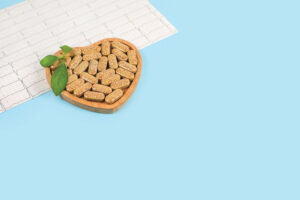A few years ago, I was asked to write the chapter, “Pomegranate Juice and Extract,” for the new textbook Fruits, Vegetables and Herbs (2016, Academic Press, Oxford)—which I did. Since that time, additional, significant research on pomegranate extract has come to my attention, leading me to write this article to serve as an update on the importance of this botanical, especially for its cardiovascular health benefits.
A Brief History of Pomegranate
Let’s start with a brief history of pomegranate (Punica Granatum L.), which, for thousands of years, has been used as a food and traditional medicine. Originating in the Middle East, it can now be found as a crop in the Far East, India, the Mediterranean and the Americas where it is utilized fresh and in processed form as juice, wines, flavors and extracts. Pomegranate’s use as a medicine is also ancient, originating from the folk medicine of cultures in the Caucasus and Mediterranean basin, and discussed in the Ebers Papyrus from Egypt (c. 1500 BCE), one of the oldest medical texts.1
Plant Parts
The parts of pomegranate that have been used medicinally include the fruit, fruit juice, seed, seed oil, bark, pericarp (aka rind or fleshy peel), root, stem, leaf and flower.2,3 The active phytocompounds in pomegranate primarily consist of a range of polyphenols, such as punicalagins. Perhaps the most active parts are the juice and pericarp since they contain a range of antioxidant polyphenols and other phytocompounds.4 Much of the research I’ll be reviewing in this article was conducted using a whole-fruit, full-spectrum extract, obtained through a water-only extraction technology (Pomanox by Euromed) containing phytocompounds from pomegranate juice and the peel, including up to 30 percent punicalagins, which are among nature’s most powerful antioxidants.
Now, let’s dive into the research on pomegranate’s cardiovascular benefits.
Cardiovascular Benefits
In research studies, whole-fruit, full-spectrum pomegranate extract (Pomanox) improved the health of the endothelium (the inner layer of the arteries) by counteracting vascular inflammation and oxidative damage.5,6 Unpublished research conducted at La Paz University Hospital, Madrid, Spain, on modulation of gene expression of markers associated with cardiovascular disease (CVD), confirmed 12 genes to be differentially expressed after administration of the extract to subjects with high waist circumference. In conclusion, Pomanox supplementation was found to hinder hyperlipemia-induced coron-ary endothelial dysfunction by activating the Akt/endothelial nitric oxide-synthase pathway and favorably counteracting vascular inflammation and oxidative damage.7
Importantly, normalization of BP (blood pressure) has been reported in five published academic trials and two that have been submitted for publication.8,9 High blood pressure is the greatest contributor to CVD worldwide and one of the most common CVD risk factors. A recent meta-analysis confirms the benefits of whole-fruit, full-spectrum pomegranate extract (Pomanox) and pomegranate juice consumption on BP.10 Following is a discussion of one animal study and two human clinical trials on Pomanox.
Animal Study
To investigate whether supplementation with a pomegranate extract rich in polyphenols imparts beneficial effects on coronary function, and to characterize the underlying mechanisms, a study was conducted in which pigs were fed a 10-day normocholesterolemic or hypercholesterolemic diet (normal and high cholesterol, respectively). Half of the animals were given a supplement of 625 mg/day of a pomegranate extract (Pomanox; 200 mg punicalagins/day). Release of nitric oxide (a natural compound that stimulates vasodilation), oxidative DNA damage in the coronary artery, and lipoprotein resistance to oxidation were evaluated. Results were that in dyslipidemic animals (i.e. pigs with abnormal blood lipid levels), Pomanox supplementation prevented diet-induced impairment of endothelial relaxation, reaching vasodilatory values comparable to normocholesterolemic animals. In other words, their blood vessels expanded in a healthy way, promoting good circulation. These beneficial effects were associated with the activation of endothelial nitric oxide-synthase and subsequent release of nitric oxide. Pomanox supplementation reduced systemic oxidative stress (higher high-density lipoprotein-antioxidant capacity and higher low-density lipoprotein resistance to oxidation) and coronary DNA damage. In conclusion, Pomanox supplementation helps reduce hyperlipemia-induced coronary endothelial dysfunction by activating the Akt/ endothelial nitric oxide-synthase pathway and favorably counteracting vascular inflammation and oxidative damage.
Human Study 1
Since evidence suggests that pomegranate juice consumption may alleviate CVD risk factors, a double-blind, randomized, placebo-controlled exploratory study11 was conducted to investigate the effect of consuming pomegranate extract (PE), as Pomanox, on BP, insulin resistance (HOMA-IR), stress hormone levels (cortisol/cortisone) and quality of life in 29 healthy human volunteers. All participants consumed either one PE or a placebo capsule daily, after a meal, for four weeks. Each capsule provided the following naturally occurring pomegranate compounds: 210 mg punicalagin (the recommended daily intake to provide the beneficial effects of these antioxidants), 328 mg other pomegranate polyphenols (e.g. flavonoids and ellagic acid) and 0.37 mg anthocyanins. Dietary history and habits and the health-related, quality-of-life questionnaire were recorded. BP, salivary cortisol and cortisone levels were assessed, and fasting blood was also obtained and compared to glucose, insulin and insulin resistance parameters. Results were that systolic BP was significantly reduced following PE from 120.3 to 115.6 mmHg (P=0.012). Also, there was a 27 percent reduction in the insulin resistance (P=0.045), and glucose, insulin and uric acid all decreased from baseline. No significant changes were recorded in volunteers taking the placebo. PE consumption caused a significant drop of salivary cortisol levels of 19.6 percent in the AM (P<0.001) and 32.3 and noon; 43.1 32.3 percent (p = 0.016). Likewise, those taking the PE capsules experienced significant improvement in physical (P = 0.018) and social functioning (p = 0.021), pain (p = 0.003), general health (p = 0.008) and overall Quality of Life score (p = 0.007). In conclusion, these results suggest that PE intake rich in aforementioned polyphenols may ameliorate cardiovascular risk factors, reduce stress levels and improve perceived health related quality of life. The reduction in salivary cortisol levels may prove beneficial for people suffering from chronic stress.
Human Study 2
This randomized, double-blind, placebo-controlled clinical trial12 investigated the effect of PE, as Pomanox, on blood pressure and body composition measures in 55 healthy adults. Participants enrolled were assigned to either PE capsules (same composition as in the previous study) or placebo capsules for eight weeks. Results were that there was a significant decrease in diastolic blood pressure after eight weeks (by 2.79 points, P < 0.05), with no changes in body composition. In conclusion, PE may reduce blood pressure and possibly prevent hypertension in the normotensive population.
Other Benefits
In addition to cardiovascular benefits, whole-fruit, full-spectrum pomegranate extract has demonstrated other benefits as well. These include the treatment of hair loss, and effects as a prebiotic.
Hair Loss Study
A longitudinal, randomized clinical trial13 was conducted to evaluate the healthy properties and tolerability of ingestible PE, as Pomanox (two capsules/day providing 366 mg), and a hair lotion containing Pomanox (4 ml/day) for the prevention of hair loss in people with non-scarring hair loss. The main objective was evaluation of hair regeneration by phototrichogram. Secondary objectives were anti-hair loss capacity (strength of the hair) by pull test, and the presence of sebum and/or dandruff by scalp evaluation. Participants were 20 males, aged between 34 and 60, who showed non-scarring alopecia in stages II to IV according to the Hamilton scale. Participants were divided into two groups of 10. Results are (for the ingestible PE only) that by visit three there was a 40.8 percent reduction in hair loss, per the hair pull test (P = 0.0002), a significant increase in hair density (P = 0.000), a reduction in thin hair (24.46 percent on visit 1 and 19.47 percent on visit 3, P = 0.000), and a 14.4 percent increase in hair grow rate (P = 0.000). In conclusion, supplementation with PE preventing hair loss in people with non-scarring hair loss, the regeneration of hair, and higher strength of the hair.
Prebiotic Study
Prebiotics are natural substances that help beneficial bacteria—that is, probiotics—to grow and be healthy in our gut. This study14 was performed with six healthy subjects aged between 28 and 53 years old. Each individual took one capsule daily of PE, as Pomanox at lunchtime. The volunteers were told to avoid consuming other probiotic products (e.g. fructooligosaccharides, inulin, etc.) as well as prebiotic products (e.g. yogurt, fermented milk drinks, etc). Fecal samples were taken from each of the individuals at time 0 (after 14 days prior to the administration of the PE) and also after 28 days of the administration of PE. The stool sample was used to assess the number of beneficial bacteria in the feces, expressed as percentage Lactobacillus bacteria/total bacteria or percentage Bifidobacteria/total bacteria. The researchers also assessed the amount of potentially pathogenic bacteria in the stool. The results were that five out of six individuals (83.3 percent) showed a significant increase (p< 0.05 or p< 0.01 depending on the case) in the percentage of beneficial bacteria after 28 days of PE supplementation. In addition, five out of six individuals (83,3 percent) showed a significant decrease (p< 0.05 or p< 0.01) in the percentage of Clostridium perfringens (pathogenic bacteria) in 28 days. Likewise, four out of six individuals (66.7 percent) showed a significant decrease (p< 0.05 or p< 0.01) in the percentage of Bacteroides (also pathogenic bacteria) after 28 days of pomegranate extract administration.
Furthermore, all individuals (100 percent) reported no digestive problems during the treatment, and five individuals (83.3 percent) reported achieving an unusual regularity in their intestinal transit. The remaining individual reported not having observed any changes in his habits, which were already regular.
Conclusion
Pomegranate has an extensive history of use as a food and as a medicinal agent. Important research has been conducted on a whole fruit, full-spectrum pomegranate extract obtained through a water-only extraction technology and containing phytocompounds from pomegranate juice and the peel, including up to 30 percent punicalagins. This research suggests that this pomegranate extract, may ameliorate cardiovascular risk factors (especially help reduce blood pressure), reduce stress levels, improve perceived health related quality of life, promote healthy hair growth, and function as an effective prebiotic agent, increasing levels of beneficial Lactobacillus and Bifidobacteria species. VR
References:
1 Bruno G. Pomegranate Juice and Extract. In Fruits, Vegetables and Herbs. Oxford: Academic Press; 2016:293-312.
2 Schubert SY, Lansky EP, Neeman I. Antioxidant and eicosanoid enzyme inhibition properties of pomegranate seed oil and fermented juice flavonoids. J Ethnopharmacol. 1999; 66:11–17.
3 Huang TH, Yang Q, Harada M, et al. Pomegranate flower extract diminishes cardiac fibrosis in Zucker diabetic fatty rats: modulation of cardiac endothelin-1 and nuclear factor-kappaB pathways. J Cardiovasc Pharmacol. 2005; 46:856–862.
4 Bruno G. Pomegranate Juice and Extract. In Fruits, Vegetables and Herbs. Oxford: Academic Press; 2016:293-312.
5 Martín-Sánchez F, Diamond C, Zeitler M, et al. Inflammasome-dependent IL-1β release depends upon membrane permeabilisation. Cell Death Differ. 2016 Jul;23(7):1219-31.
6 Al-Dujaili E, Smail N. Pomegranate juice intake enhances salivary testosterone levels and improves mood and well being in healthy men and women. Endocrine Abstracts. 2012; 28 P313.
7 Vilahur G, Padró T, Casaní L, et al. Polyphenol-enriched Diet Prevents Coronary Endothelial Dysfunction by Activating the Akt/eNOS Pathway. Rev Esp Cardiol (Engl Ed). 2015; 68(3):216-25.
8 Tsang C, Smail NF, Almoosawi S, et al. (2012) Intake of polyphenol-rich pomegranate pure juice influences urinary glucocorticoids, blood pressure and homeostasis model assessment of insulin resistance in human volunteers. J Nutr Sci. 2012; 1:e9.
9 Emad A S Al-Dujaili EAS, Good G, Tsang C. Consumption of Pomegranate Juice Attenuates Exercise – Induced Oxidative Stress, Blood Pressure and Urinary Cortisol/Cortisone Ratio in Human Adults. 4(6): 982-995.
10 Sahebkar A, Ferri C, Giorgini P, Bo S, Nachtigal P, Grassi D. Effects of pomegranate juice on blood pressure: A systematic review and meta-analysis of randomized controlled trials. Pharmacol Res. 2017 Jan;115:149-161.
11 Stockton A, AS Al-Dujaili E, McDougall GJ, et al. Effect of Pomegranate Extract Consumption on Cardiovascular Disease Risk Factors, Stress Hor¬mones, and Quality of Life in Human Volunteers: An Exploratory Randomised, Double-Blind, Placebo-Controlled Trial. EC Nutrition. 2015; 2.4:396-411.
12 Stockton A, Farhat G, McDougall GJ, Al-Dujaili EAS. Effect of pomegranate extract on blood pressure and anthropometry in adults: a double-blind placebo-controlled randomised clinical trial. J Nutr Sci. 2017 Aug 9;6:e39.
13 Randomized clinical trial to evaluate the healthy properties and tolerability of two treatments for the prevention of hair loss in people with non-scarring alopecia. Unpublished. Euromed.
14 In-vitro and in-vivo studies on the Bifidogenic effect of Pomanox. Unpublished. Euromed.
Gene Bruno, MS, MHS, the dean of academics for Huntington College of Health Sciences, is a nutritionist, herbalist, writer and educator. For more than 30 years he has educated and trained natural product retailers and health care professionals, has researched and formulated natural products for dozens of dietary supplement companies, and has written articles on nutrition, herbal medicine, nutraceuticals and integrative health issues for trade, consumer magazines and peer-reviewed publications. He can be reached at gbruno@hchs.edu.













